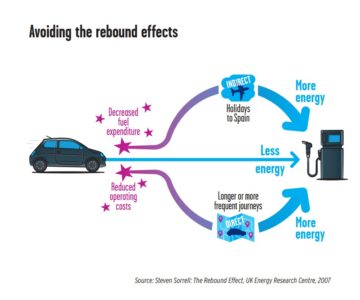
The rebound effect, the hidden face of energy efficiency
Saving energy can lead to spending more. This paradox has a name: the rebound effect. This phenomenon is particularly visible in sectors where improvements in energy efficiency sometimes lead to an increase in consumption. To avoid these adverse effects, it is important to evaluate the role of users and to ensure that they are better informed.
The news came as a shock: in a report published in July 2020, Germany’s leading federation of real estate companies, the GdW, revealed that despite billions invested in energy renovation in buildings, the average annual consumption of housing, which had fallen by 31% between 1990 and 2010, had remained at the same level since then: around 130 kWh per square meter1.
One of the reasons given was the behavior of users: wanting to take full advantage of the insulation qualities of their homes, many had made a habit of pushing heating to 22 degrees, above the recommended 20 degrees.
When energy efficiency leads to overconsumption
This example is a good illustration of the “rebound effect”: a sort of boomerang effect whereby an improvement in energy efficiency leads to an overall increase in consumption.
There is something paradoxical about the rebound effect. It is also sometimes referred to as the “Jevons paradox”, after the British economist William Stanley Jevons who first explained it in 1865. “The idea that more efficient use of fuel equals less consumption is a complete confusion. The reverse is true,” he wrote, noting that the improved energy efficiency of the steam engine led to a reduction in the cost of coal, and an increase in its overall consumption.
The rebound effect can be direct when, as in the example of coal, the decline in price leads to an increase in consumption. The same could be said of improvements in the energy performance of vehicles. At the beginning of the 20th century, the Ford T, which weighed just over 500 kilograms, consumed 18 liters per 100 km, three times more than most cars today. This evolution has not seen a reduction in consumption: on the contrary, the decline in the cost per kilometer has encouraged motorists to travel greater distances. At the same time, car sales have increased: 80% of households had at least one vehicle in 2005, compared to 60% in 1973. And the overall volume of road fuel consumption, apart from a few periods of market tension (between 1974 and 1985 in particular), has risen strongly.
The rebound effect can also be indirect, when the increase in purchasing power resulting from energy efficiency translates into a shift in consumption to other types of spending: the purchase of a larger television set, for example, or a trip abroad, thanks to lower heating bills.

Users at the center of the energy transition
These numerous examples of rebound effects are a serious blow to the “techno-solutionist” or “techno-optimist” scenarios, which would like innovation to be enough to drive the energy transition, without the need to change lifestyles.
The Centre d’analyse stratégique (CAS, which has since become France Stratégie) pointed this out as early as 2011: “(…) technical progress will not be enough to solve the environmental problems we are facing. According to the International Energy Agency, it will only account for half of the effort needed to reach our greenhouse gas emission reduction targets. To go further, we will also have to change our behavior”2.
As far as housing is concerned, the CAS proposed that future construction and renovation campaigns should be accompanied by incentives to encourage energy savings3. The challenge is to ensure that the energy transition is not just a technological one and that new consumption habits are established among all populations.
1 Cécile Boutelet, « En Allemagne, les rénovations énergétiques des bâtiments n’ont pas fait baisser les consommations », Le Monde, 4 octobre 2020.
2“Pour une consommation durable”, Rapport de mission du Centre d’analyse stratégique n°33, La documentation française, janvier 2011.
3“Comment limiter l’effet rebond des politiques énergétique dans le logement ? L’importance des incitations comportementales”, La note d’analyse du Centre d’analyse stratégique n° 320, février 2013.

